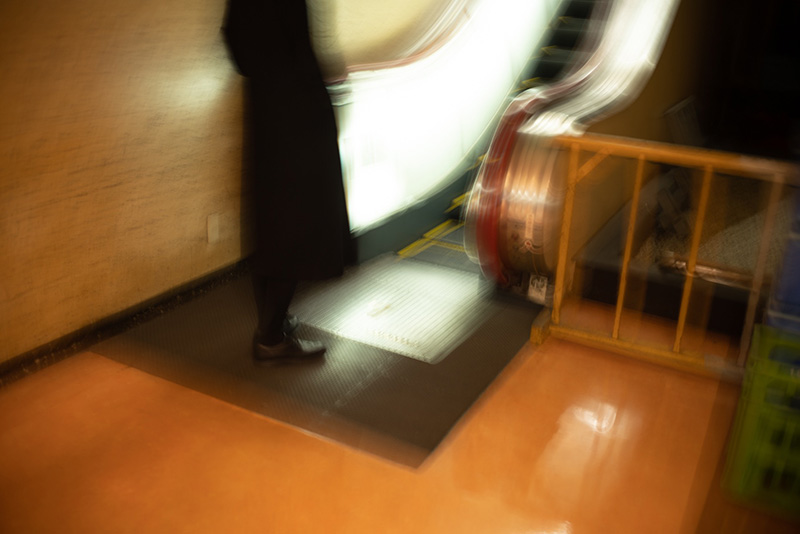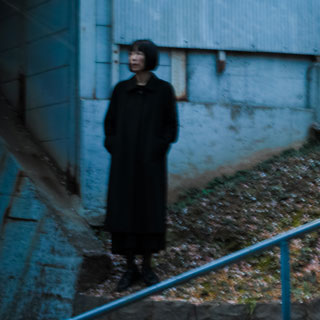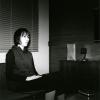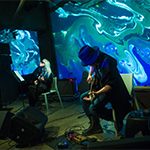MOST READ
- interview with xiexie オルタナティヴ・ロック・バンド、xiexie(シエシエ)が実現する夢物語
- Chip Wickham ──UKジャズ・シーンを支えるひとり、チップ・ウィッカムの日本独自企画盤が登場
- Natalie Beridze - Of Which One Knows | ナタリー・ベリツェ
- 『アンビエントへ、レアグルーヴからの回答』
- interview with Martin Terefe (London Brew) 『ビッチェズ・ブリュー』50周年を祝福するセッション | シャバカ・ハッチングス、ヌバイア・ガルシアら12名による白熱の再解釈
- VINYL GOES AROUND PRESSING ──国内4か所目となるアナログ・レコード・プレス工場が本格稼働、受注・生産を開始
- Loula Yorke - speak, thou vast and venerable head / Loula Yorke - Volta | ルーラ・ヨーク
- interview with Chip Wickham いかにも英国的なモダン・ジャズの労作 | サックス/フルート奏者チップ・ウィッカム、インタヴュー
- interview with salute ハウス・ミュージックはどんどん大きくなる | サルート、インタヴュー
- Kim Gordon and YoshimiO Duo ──キム・ゴードンとYoshimiOによるデュオ・ライヴが実現、山本精一も出演
- Actress - Statik | アクトレス
- Cornelius 30th Anniversary Set - @東京ガーデンシアター
- 小山田米呂
- R.I.P. Damo Suzuki 追悼:ダモ鈴木
- Black Decelerant - Reflections Vol 2: Black Decelerant | ブラック・ディセレラント
- Columns ♯7:雨降りだから(プリンスと)Pファンクでも勉強しよう
- Columns 6月のジャズ Jazz in June 2024
- Terry Riley ——テリー・ライリーの名作「In C」、誕生60年を迎え15年ぶりに演奏
- Mighty Ryeders ──レアグルーヴ史に名高いマイティ・ライダース、オリジナル7インチの発売を記念したTシャツが登場
- Adrian Sherwood presents Dub Sessions 2024 いつまでも見れると思うな、御大ホレス・アンディと偉大なるクリエイション・レベル、エイドリアン・シャーウッドが集結するダブの最強ナイト
Home > Interviews > interview with Phew - いまは本当に、日常を繰り返すこと。それを自分に決めています
interview with Phew
いまは本当に、日常を繰り返すこと。それを自分に決めています
──パンクのリジェンドが語る、新作と「いま」あるいは「未来」
Interview/translation: James Hadfield
It comes as no surprise to discover that Phew doesn’t think much of archival labels. Four decades after she emerged with Osaka punk group Aunt Sally, then released one of the most striking solo debuts ever to come out of Japan (or anywhere else, for that matter), she could easily have chosen to cash in on past glories. Instead, she’s spent the past few years making some of the most potent music of her career, following her remarkable rebirth as a solo electronic musician in the 2010s. Since the release of “A New World” in 2015, Phew has created an utterly distinctive sound, defined by synthesizer drones, skeletal rhythms and eerie vocal swarms. In addition to two well-received international releases, “Light Sleep” and “Voice Hardcore,” she’s toured extensively overseas, including in a duo with fellow punk survivor Ana da Silva, of The Raincoats. Phew’s latest collection, “Vertigo KO” (Disciples), compiles unreleased material and a couple of new tracks, recorded between 2017 and 2019. In the liner notes, she describes it as an “unconscious sound sketch,” and it resonates powerfully with the uneasy times we’re living in.
JH:How have you been spending your time during during the pandemic?
PHEW:All my live dates were cancelled in March, which knocked me off my stride. While the state of emergency was in effect in Japan, there were times when I felt confused, and wasn’t sure what to do with myself. I’m already accustomed to living like this, though. I like being at home―reading books, listening to music, watching films―so not being able to go out hasn’t been so hard. But it’s made me really conscious of how I was spending my everyday life. All those daily routines that used to bore me, like sleeping, getting dressed, shopping and eating―I’m doing them more intentionally now. I’d like to start playing gigs again too, once that becomes possible, though we’re not quite there yet.
JH:When “Vertigo KO” was announced, I was really struck by what you described as the album’s hidden message: “What a terrible world we live in, but let’s survive.” It felt like a wonderful way of putting it.
PHEW:(Laughs) In fact, that doesn’t have anything to do with the coronavirus. For the past five years or so, I’ve seen for myself how disparities are widening―not just in Japan, but also in places I’ve visited on tour―and this left me feeling that it’s a really hard world to live in. I was already thinking “what a terrible world” before the coronavirus came along.
JH:I feel like your music―especially your recent work―evokes a strong sense of solitude, like it’s being created in isolation from the world. You were already making music at home before the pandemic, but are you aware of it influencing your work in other ways?
PHEW:I think I’ll realise that further down the line. I’m just taking one day at a time―that’s what I’ve decided to do. There are lots of awful things happening at the moment, but I can’t respond to them right away. That’s not to say that I’m averting my eyes from all of that: I know what’s going on in the world, I’m just not getting too caught up in the current moment. It’s like (I’m creating) an antithesis to the era. Then again, rejecting the present is like saying you wish reality was different, and I appreciate it’s impossible to change what’s already happened. So I take a position of trying to understand at least something about the current state of the world, based on information I can gather myself. I’m maintaining these two forms of awareness as I go about my daily life, and the irony and humour that comes from that is reflected in the music I make. (Laughs) Did you get all that?
JH:I think perhaps this ties in with what you said about your release for Cafe OTO’s TakuRoku label (“Can you keep it down, please?”)―about how you’re creating your own future through your music?
PHEW:That’s because I’m thinking about the future at the moment, not just in relation to music. I think about the past, too. There’s no “now”: just the past and the future. What we call “now” is really a void. That’s why I can’t convey now what’s happening now.
JH:Right…
PHEW:So even though things are bad… I don’t want to say you can’t help what happens, but I can’t think too much about the future. I’m only able to make definite plans a few weeks ahead, or even only a few days.
JH:I went back to “A New World” this morning, for the first time in a while. I’d thought of that album as a gateway to the music you’ve created since, but revisiting it now, I felt it had a stronger connection with your past. In some senses, it's like it was marking the end of something, rather than the beginning. Would you agree with that?
PHEW:I wonder about that… I don’t listen to my old releases, but I’ve had times when my impressions of other people’s music have changed, and I’ve discovered something new. I’m from the “anti hippy” generation, so when I first started getting obsessed about music, I particularly avoided stuff from the 1960s. I’ve come to realize that was a real waste. (Laughs)
JH:I know what you mean!
PHEW:Seriously! The Grateful Dead were active at the time, but I’d closed my ears to it. When I was young, I jumped to the conclusion that it was all hippy music, which was a mistake. But there are things I liked when I was younger that I like even more now. That’s definitely true of Kraftwerk. I hated hippies, but Can and Kraftwerk were different.
JH:Was that anti-hippy stance something you absorbed from others, or did you come upon it by yourself?
PHEW:I’d seen everything with my own eyes as a teenager: how the battles of the 1960s ended in defeat. Rock music during the first half of the 1970s didn’t do anything for me. David Bowie dazzled me when I first heard him at junior high; I think it was around “Aladdin Sane.” I got into T-Rex, which was also dazzling, but totally empty. Maybe this was just a Japan thing, but Bad Company and Deep Purple were really popular here at the time, and I hated them! I hated the clothes, the music, the way they were marketed to girls with these titillating articles in the music press. I haven’t liked that since I was at junior high. My older sister had a copy of Bad Company’s first album, on Island Records, and there was an insert introducing the label’s other artists. There was a photo of Sparks’ “Kimono My House,” and I bought it based on the album cover. My first impression was that they were real oddballs: they weren’t like Bowie, they had a different vibe from Bolan’s glittery thing. When I listened to them, it clicked immediately. The mainstream at the time was hard rock like Deep Purple, but I started searching out music in the corners. Sparks were released in Japan, too. I was able to find them at my local record shop, and then that tied in with the New York punk scene. Sorry, I’m just rambling on about the past!
JH:No, it’s fine! In the liner notes for “Vertigo KO,” you talk at a few points about making music unconsciously, or without thinking. Can you tell me a bit about that distinction?
PHEW:For instance, if someone asks me to make something, it will be a very conscious process. There are a lot of constraints, too. When I’m making a solo album, I can work freely, so it becomes more unconscious, making sounds without deciding anything in advance. But it’s impossible to make something completely without conscious input, because I’ll still be editing tracks in order to make an album. The performance itself is partly unconscious; a lot of times, I’ll let the sound dictate what comes next. But when I have to turn that into a finished package, obviously that becomes a conscious act of creation.
JH:I take it that the Raincoats cover on the album (“The Void”) is an example of a consciously created track?
PHEW:That’s right. It was a request from a radio show, which asked me to cover a song that was released in 1979. I’d just done the album with Ana, and I liked The Raincoats, so I picked one of their songs which I was particularly of fond of, “The Void.” I put a lot of thought into how I’d cover it. For instance, The Raincoats are talked about in terms of post-punk and new wave, but I find it so boring when things are always framed in the same way―and this has happened with me as well. So when I covered the song, I was looking for a way to liberate it from that particular context.
JH:Has Ana heard it?
PHEW:Yes, I sent it to her right away.
JH:What did she think?
PHEW:She appreciated it.
JH:You’ve already released one album with Ana, and I saw that you had another one in the works…
PHEW:I’m not sure you’d call it an album. We’re doing a project at the moment where we’re uploading tracks created during lockdown, and I think we’ll compile those into a release.
JH:How has the collaboration evolved in the course of working and touring together?
PHEW:I toured with Ana last year, but my main focus was working on my solo album. I didn’t have much time for recording, as I was touring so much. We started talking about doing another collaboration earlier this year, and we uploaded a track to Bandcamp in June (“ahhh”). We’d originally planned to go on tour in Europe during June, but that got cancelled. At the moment, we’re sending files back and forth to each other, like we’re exchanging letters. I can’t really say if it will lead to a standalone album. Maybe that’s one thing that’s changed since the start of the pandemic. I was talking earlier about not setting goals for the future, but until last year, it was normal for me to work towards making an album, and I’d create music with that in mind. But physical distribution has ground to a halt this year: it takes forever for deliveries to arrive from the UK and US, and you can only send things via surface mail from Japan. Given the facts of the situation, it feels hard to think about releasing an album right now.
JH:Speaking of albums: there are some variations between the releases you’ve put out in Japan and internationally. “A New World” came out here, but not many people overseas seem to have heard of it. “Light Sleep” was a compilation, the international edition of “Voice Hardcore” is different from the Japanese one, and “Vertigo KO” is also kind of a compilation…
PHEW:Right, right. “Vertigo KO” started when the guy from Disciples came to watch Ana and me play, and slipped me a hand-written note. He’d been listening a lot to my recent work, and said he wanted to release some of my recordings. The next time I went to London, we met up and talked about it. The label’s concept is to release collections of unreleased recordings, rather than new material, so I initially had some reservations. I didn’t have a good impression of archival releases. Even if it’s not rarities from the 1980s (laughs), I don’t think much of releasing that kind of stuff as a business. But Disciples weren’t talking about music from a long time ago: they were interested in the solo material I’d recorded over the past 4 or 5 years, which was unusual. Up until then, I’d had lots of people ask about my first album (“Phew”), Aunt Sally, or my debut single that Ryuichi Sakamoto produced (“Finale”), but Disciples were different―which was a change! When I got back to Japan, I sent them some unreleased recordings and they decided the track selection. The tracks they picked felt fresh, and since it was going to be an album, I threw in a couple of new songs. So it’s really a collaboration with the label. Like I said earlier, I don’t listen to my old music, but in this case it couldn’t be helped, and it turned out to be a really interesting experience: it was like remixing my past. A lot of ideas came out during my exchanges with the label, the album title included.
JH:So do you think you’d like to do the same sort of thing again, or was it a one-off?
PHEW:I enjoyed the process this time, and I’d happily do it again given the chance, but what I really want to do now is release an album of the new material I’ve recorded over the past year.
JH:Is that going to be in the vein of “Hearts and Flowers” (the closing track on “Vertigo KO,” which Phew has described as the genesis for her next album), or something different?
PHEW:I have an album’s worth of material that’s like a continuation of that. But like I was saying earlier, it’s hard to make and sell records and CDs at the moment, so I’m still weighing up my options. I’m planning to self-release something, but that won’t be until next year.
JH:Out of interest, was your decision to self-release “Voice Hardcore” in Japan made out of necessity or choice?
PHEW:I think I’d probably come to the conclusion that nobody was going to release it for me! I didn’t even try looking for a label. I wanted to put something together before I went on tour in Europe, and figured it would be quicker to release it myself. When you release something through a label, it’s going to take a minimum of two or three months, but I could cut that down to a month or so if I did it myself. I’m not sure there were any labels in Japan that would have released “Voice Hardcore.” (Laughs)
JH:I wonder about that. It seemed to get a really good response overseas.
PHEW:When I do shows in Japan, it’s not like I’m playing at 1,000 or 2,000 capacity venues, is it? I’m doing gigs at places that are small enough for me to see the audience’s faces, and it’s the same in other countries. It was a relief to realise that there were people who’d listen to my music scattered all over the world. So it’s not a question of Japan being better or worse: I think it’s the same everywhere! Even if “Voice Hardcore” got a good reception in London or New York, I’m not going to be performing in front of 1,000 or 2,000 people over there. I think the scale is the same. The main difference is that in places like New York, there are more funding options from groups and organizations that support experimental and improvised music than in Japan.
JH:I have the impression that there was a lot more corporate sponsorship available in the 1980s in Japan, but I guess you weren’t associating much with that world at the time?
PHEW:You could see all kinds of stuff in Japan in the 1980s. There were lots of opportunities to experience culture from around the world―not just music, but also theatre, dance and contemporary art, especially in Tokyo. During the Bubble era, there was the money to bring people over, but I don’t feel like it left any kind of legacy: there’s no connection with what’s happening now. I lived through that whole period, but during the 1980s I was living in opposition to the era. I could see what was going on, but I kept my distance.
JH:I’m not sure if this is related, but venues and cinemas have been really struggling during the coronavirus pandemic. You were posting about this on Twitter back in April and May, but do you think there’s more that should be done to support them?
PHEW:I’m not sure there’s much I can do personally, besides making donations and buying merchandise. I think there has to be more financial assistance, but there are hardly any industries that haven’t been affected by the pandemic―it’s basically hit everyone, hasn’t it? We all just have to do what we can to scrape by. It’s hard to take a broader view: we’re so caught up in the midst of this that we can’t see what will come next. That’s why I’m treasuring daily life so much. I saw yesterday that Japan’s GDP had dropped 27%, and it’s even worse in the EU and US. I have no idea what’s going to happen next… and all the possibilities I can think of are bad! (Laughs) For now, all I can do is carry on with my daily life, although that might gradually change over time. With live venues, my heart goes out to them―it’s really tough. They aren’t just places for showcasing your own music: it’s hard not having somewhere for people to gather informally. More than anything, I’ve always liked the atmosphere of clubs and live venues. When it’s an all-night event, by 3 or 4 in the morning, everyone’s sleeping on the floor, right? They’re so defenceless: everyone looks like stray cats! (Laughs) That wouldn’t happen anywhere else, except at a club. It’s painful seeing these safe spaces for music lovers in such a critical state, and we can’t let them disappear.
JH:Finally: this is a weird question, but my favourite track from “Voice Hardcore” is “Nice Weather,” which features pleasantries about the weather (“Nothing happened / The weather was nice”), and you return to the theme again on this album. I’m from the UK, and it’s a regular topic of conversation there too, but what do you think Japanese people are really talking about when they talk about the weather?
PHEW:It’s like we’re not able to talk about anything other than the weather! There are only limited opportunities for people to speak freely, and the smallest thing might be misunderstood or taken out of context. It’s safe to stick to the weather, or the changing seasons. (Laughs) Nobody’s going to take issue with that! With the UK, you’ve got quite a long history of people from different cultures living together, so perhaps the weather is the safest topic of conversation?
JH:I think there’s something to that. One difference with Japan is that people in the UK are more willing to talk about politics, but I’d agree that it’s safest to stick to the weather.
PHEW:I’m happy talking politics face to face, but I don’t want to make public pronouncements about it.
JH:I thought you were pretty direct about those things. Or is that just in interviews?
PHEW:With interviews, if I can at least see the person I’m talking to, then if they ask me about these things, I’ll give them a straight answer. But I don’t want to say anything to someone I can’t see. When people start addressing messages to an invisible audience, whether it’s politicians or artists, I tune them out. (Laughs) I won’t listen!
JH:I think that’s a good policy! Shall we wrap things up here?
PHEW:I hope we’re able to see each other in person next time! Thank you.
文・質問:ジェイムズ・ハッドフィールド(2020年9月07日)
| 12 |
Profile
 ジェイムズ・ハッドフィールド/James Hadfield
ジェイムズ・ハッドフィールド/James Hadfieldイギリス生まれ。2002年から日本在住。おもに日本の音楽と映画について書いている。『The Japan Times』、『The Wire』のレギュラー執筆者。
James Hadfield is originally from the U.K., but has been living in Japan since 2002. He writes mainly about Japanese music and cinema, and is a regular contributor to The Japan Times and The Wire (UK).
INTERVIEWS
- interview with xiexie - オルタナティヴ・ロック・バンド、xiexie(シエシエ)が実現する夢物語
- interview with salute - ハウス・ミュージックはどんどん大きくなる ──サルート、インタヴュー
- interview with bar italia - 謎めいたインディ・バンド、ついにヴェールを脱ぐ ──バー・イタリア、来日特別インタヴュー
- interview with Hiatus Kaiyote (Simon Marvin & Perrin Moss) - ネオ・ソウル・バンド、ハイエイタス・カイヨーテの新たな一面
- interview with John Cale - 新作、図書館、ヴェルヴェッツ、そしてポップとアヴァンギャルドの現在 ──ジョン・ケイル、インタヴュー
- interview with Tourist (William Phillips) - 音楽はぼくにとって現実逃避の手段 ──ツーリストが奏でる夢のようなポップ・エレクトロニカ
- interview with tofubeats - 自分のことはハウスDJだと思っている ──トーフビーツ、インタヴュー
- interview with I.JORDAN - ポスト・パンデミック時代の恍惚 ──7歳でトランスを聴いていたアイ・ジョーダンが完成させたファースト・アルバム
- interview with Anatole Muster - アコーディオンが切り拓くフュージョンの未来 ──アナトール・マスターがルイス・コールも参加したデビュー作について語る
- interview with Yui Togashi (downt) - 心地よい孤独感に満ちたdowntのオルタナティヴ・ロック・サウンド ──ギター/ヴォーカルの富樫ユイを突き動かすものとは
- interview with Keiji Haino - 灰野敬二 インタヴュー抜粋シリーズ 第3回 『天乃川』とエレクトロニク・ミュージック
- interview with Sofia Kourtesis - ボノボが贈る、濃厚なるエレクトロニック・ダンスの一夜〈Outlier〉 ──目玉のひとりのハウス・プロデューサー、ソフィア・コルテシス来日直前インタヴュー
- interview with Lias Saoudi(Fat White Family) - ロックンロールにもはや文化的な生命力はない。中流階級のガキが繰り広げる仮装大会だ。 ——リアス・サウディ(ファット・ホワイト・ファミリー)、インタヴュー
- interview with Shabaka - シャバカ・ハッチングス、フルートと尺八に活路を開く
- interview with Larry Heard - 社会にはつねに問題がある、だから私は音楽に美を吹き込む ——ラリー・ハード、来日直前インタヴュー
- interview with Keiji Haino - 灰野敬二 インタヴュー抜粋シリーズ 第2回 「ロリー・ギャラガーとレッド・ツェッペリン」そして「錦糸町の実況録音」について
- interview with Mount Kimbie - ロック・バンドになったマウント・キンビーが踏み出す新たな一歩
- interview with Chip Wickham - いかにも英国的なモダン・ジャズの労作 ──サックス/フルート奏者チップ・ウィッカム、インタヴュー
- interview with Yo Irie - シンガーソングライター入江陽がいま「恋愛」に注目する理由
- interview with Keiji Haino - 灰野敬二 インタヴュー抜粋シリーズ 第1回 「エレクトリック・ピュア・ランドと水谷孝」そして「ダムハウス」について

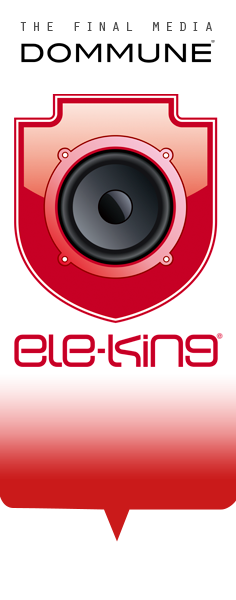
 DOMMUNE
DOMMUNE